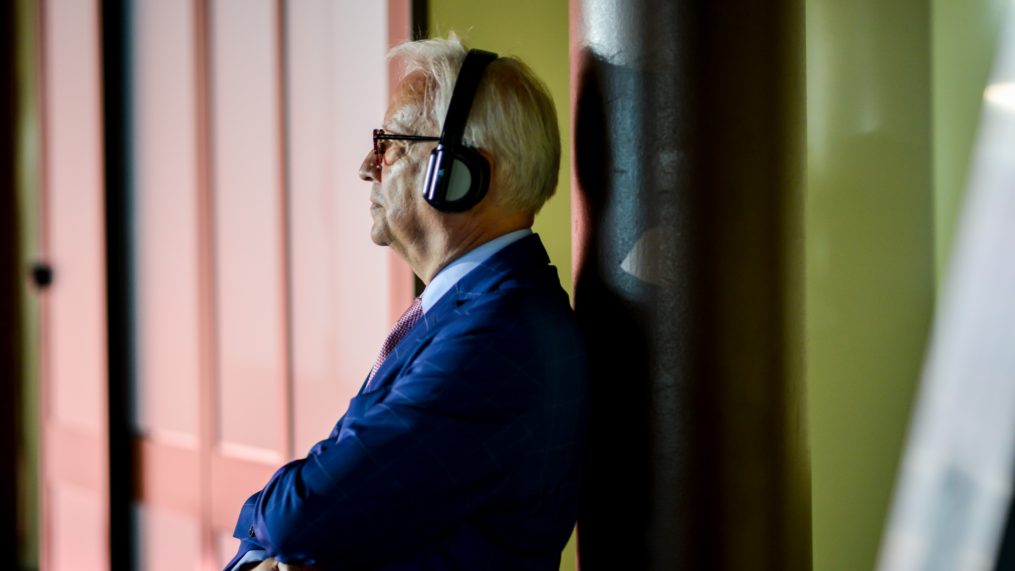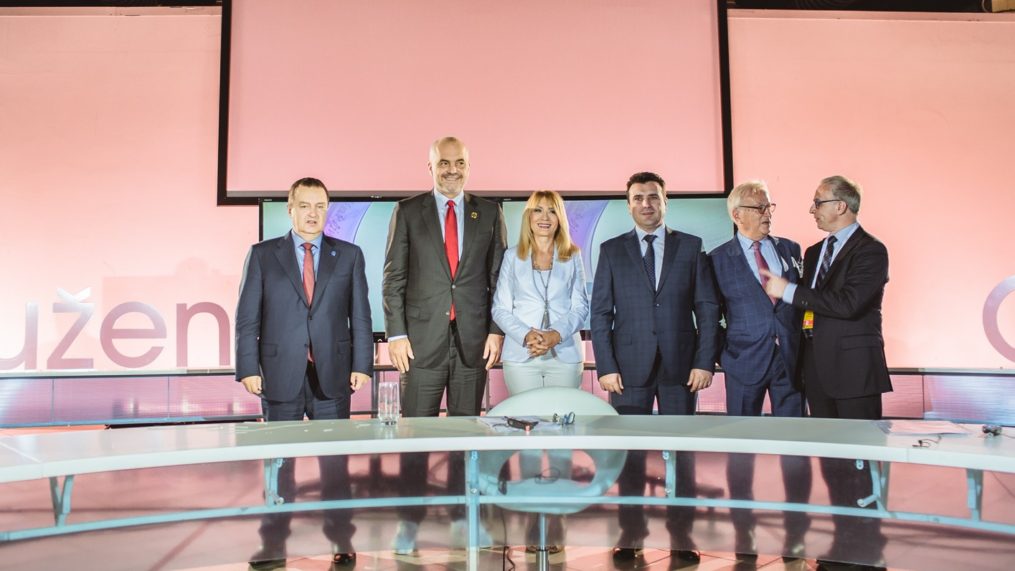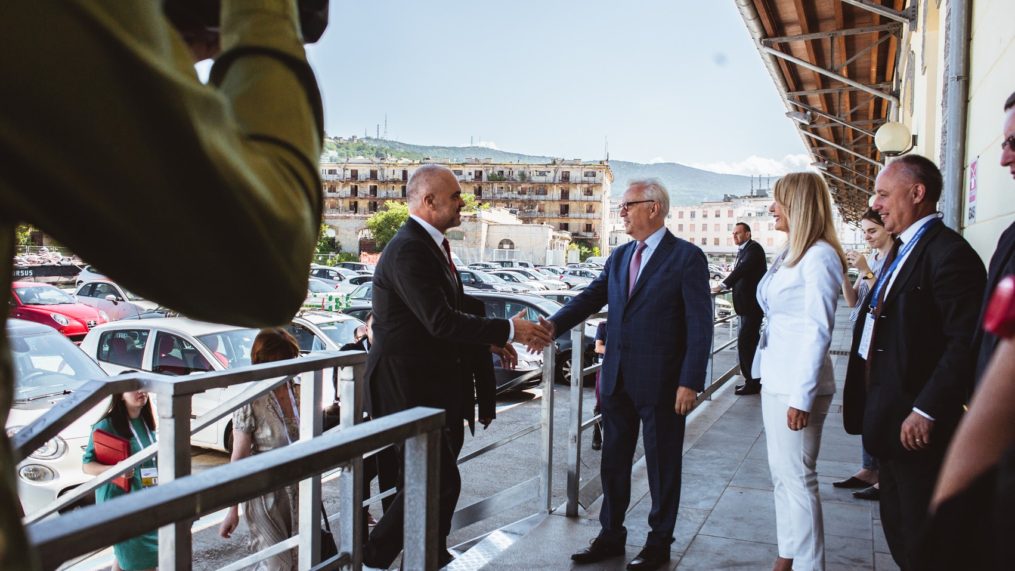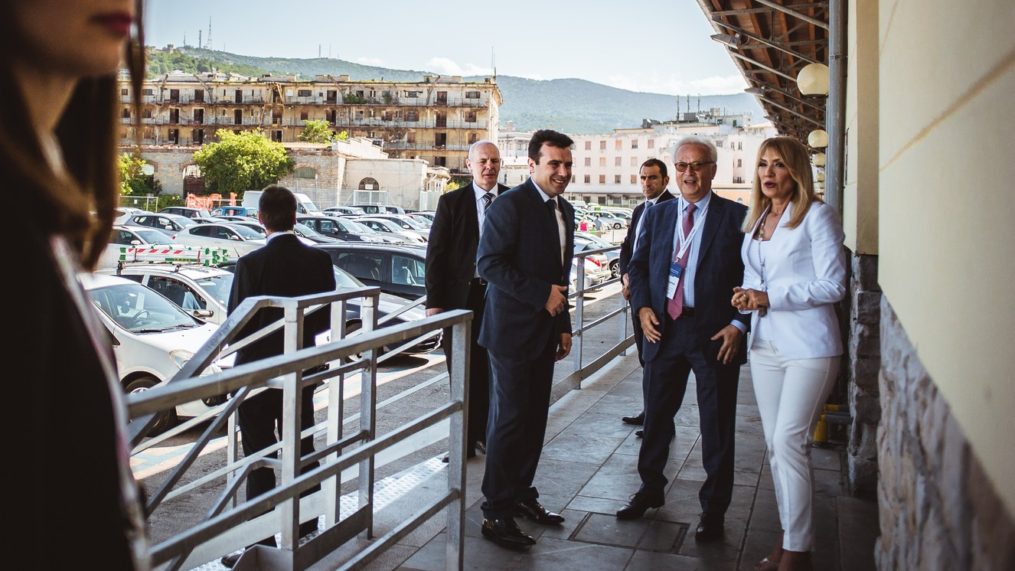Trieste – capital of the Balkans?
TRIESTE SUMMIT 2017: ANOTHER STEP TOWARDS EU INTEGRATION?
For two days the north-Italian city Trieste became the center of discussions about the Balkans and its relationship with the European Union. Writing these lines I sit just opposite the very harbour building I was attending a first conference immediately after the explosion of Yugoslavia and the independence of Slovenia. Latest since then my emotional relation to the region of South East Europe developed and stayed active.

Trieste and its special link to the Balkans
But back – or forward – to the presence. The night before the official opening of the Civil Society Forum Trieste, which itself took place the day before the official Western Balkan Summit we saw a film about Trieste being the center for shopping by Yugoslavs crossing the nearby border. Many of them came by bus, train or cars to buy jeans and other clothes not available yet in Yugoslavia itself. Nowadays the Western companies and shops are coming to the people and no longer the people have to come to Western shops. And some of the borders like that of Slovenia to Italy are open, others are still existing although with visa liberalization some steps towards free movement have been made.
I was invited to participate at the first round table discussing the future of democracy in the region. In fact we were invited to sit in a boat in the middle of the conference room. It should symbolize the moving target of EU rapprochement of the Western Balkans. And it could also symbolize the ups and downs of democracy in the Balkans but also in Europe itself like a boat which is sometimes crossing quiet water and sometimes confronted with a rough sea.
An active Civil Society must help implementation of reforms on the Balkans
As EU members we have to confess: Europe is not throughout a role model for democracy. We ourselves have to fight inside the EU for implementation of our basic human and civil rights. Nevertheless the EU and especially the EU Commission and the Parliament should give more and clearer support for the civil society which is fighting for democracy and the rule of law even if our influence is limited. But sometimes we tolerate too long the behavior of canditate countries in clear contradiction to our principles, like happened in Macedonia with the former government. And also in Serbia we should have a more critical position concerning the media control by the state.
Of course Europe has an interest in stability in the region. We do not want new conflicts or old conflicts to be enflamed. And new wars would be disastrous. But we should also express our dislike of – what is called with a new word – „stabilitocracy“, authoritarian governments which seem to guarantee stability. The new model of nationalist, capitalist and authoritarian governments which some of our European government represent cannot be the model Europe is relying on and even propagating. Maybe in the short term they offer stability but that will not be true in the long term.
The civil society which is interested in a functioning democracy is of course especially sensitive towards the European interest in stability. On the one hand the EU cannot fulfill expectations of „regime change“ which some NGOs would like the EU to implement. On the other hand the EU should, while respecting the elected governments, express the necessary criticism of gross deviations from European principles.
But the civil society cannot only rely on the EU for more support. They must try to get more support inside their own countries. Too often they are embedded in the urban middle- and upper class with an European and/or cosmopolitan outlook. As long as the governments have the feeling, that they represent a minority with minority view taking up „peripheral“ issues, they will not listen very much to the civil society. In addition, because of the absence of strong trade unions and other organized organizations to represent weaker social groups the civil society of the region has to take on board also economic and social issues. They should also care for local issues including in the rural areas to broaden their appeal. In this way they could gain more support from „ordinary citizens“. I know, that this a huge task, but some broadening of issues and activities will be necessary.
Education and understanding the roots of conflicts
Another important issue that was raised during our debate was the question of education and it is a crucial one. The younger generation needs not only more chances for finding adequate jobs and incomes. They should also learn how to be active in a diverse and multicultural society without following the nationalist seductions. Too often have these primitive appeals to national pride and „destination“ – what ever that means – resulted in turmoil and disaster especially in the Balkans. And it is not so long since the bloody wars could be stopped. There are still forces in the region who are ready to put oil into the fires of the past in order to reflame/relight ??? them. They want to keep some of them alive for use whenever they deem them necessary for their political purposes.
My engagement with the Centre for Democracy and Reconciliation in South East Europe – situated in Saloniki – is carried from the conviction that the task fighting nationalism and striving for reconciliation is not yet over. The history books we produce, where historical events are seen and interpreted from different angles, are a fine and worthy contribution to understanding history and learn from it. And especially they could help to understand the different roots of – avoidable – conflicts.
The civil society event in Trieste was organized – by chance – on the 22nd anniversary of the massive killings in Srebrenica. The horrors of these killings should never be forgotten. But remembering them should not open new wounds and continue hatred. No, all countries have victims but also perpetrators – even in different numbers. Very often the countries and especially their nationalistic politicians remember – and honor – the victims and forget about or even deny their perpetrators. Let’s remember both in order not to fall into the trap of wrong historical interpretation and misuse of clear historical facts. Also here the history books could be of good use to avoid these traps and combat the misuse of history.
After the first panel during a lunch brake I discussed with the director of the Saloniki Centre how to proceed with the translations and the use of these history books at a cafe in the Piazza del’Unita d’Italia: Suddenly a middle aged man crossed the piazza and expressed his sincere gratitude for all I did for the Balkans and Albania in particular. He was of Albanian origin but working in Vienna since many years as a waiter in a restaurant. Of course I am happy if people are thankful for my engagement over many years. But the reaction of this Austrian Albanian or Albanian Austrian led me to a view back over the last two decades.
Still too many open questions and controversies
In November this year it will be twenty years when I started my work in the European Parliament. And soon afterward I started my engagement for the region as Vice president of the Delegation for South East Europe and then also as rapporteur for the Croatian accession to the EU. What was achieved by all those who engaged themselves for the Balkans?

Croatia joined the EU and I am happy I could help to finalize this process – even before I left the EU Parliament. But I am sad about many nationalistic voices in that youngest EU member country. Serbia has many political and economic problems and is still not recognizing the independence of Kosovo. Kosovo itself is strongly divided between different political groups and has not yet found a clear policy for its own people. Macedonia had very hard times with the old government who was not able or ready to solve the name issue with Greece. Bosnia-Herzegovina is divided as ever and found neither stability nor the necessary dynamic. Montenegro is in membership-negotiations with the EU but politically also divided with a strong man who rules the country officially and unofficially already since the time before its independence. Only in Albania the stalemate seems to have been overcome due to the recent clear election outcome. So Albania and the new government in Macedonia are the highlights but with no guarantee of some backlash in the future.
Economically on the other hand things go a lot better. The report by the Vienna Institute for International Economics, of which I am also President, shows a clear upturn for the region. Growth stays high and unemployment is slowly going down, but it stays still too high with 18%. Of course for a sustainable catching-up process there are still many reforms and more investments especially foreign direct investments necessary.
From the economic to the cultural field there are many possibilities to integrate the Balkans into the European Union, if the countries wish to integrate. Of course it would be in the interest of the European Union and its stability that this integration will be successful. Also because the migration pressure into the EU would be reduced. But the citizens of the region must take the decision. And civil society must help the citizens to come to a decision.
I can only hope that all participants in Trieste are aware of their task. Of course cities like Trieste – and also Vienna can help. The film we saw at the pre-opening, mentioned at the beginning of this contribution was called „Trieste, Yugoslavia“. Also Vienna could be called „Vienna, Yugoslavia“. Now we have certainly more people from the Balkans living in Vienna then in Trieste. But both have strong links to the former Yugoslavia and also to Albania. Also the links between the two cities themselves are strong as an architect from Trieste who lived for a long time in Vienna and is now working in Trieste told me at the Forum. She who is now engaged in a project of revitalizing the old Trieste port, found many positive words about city planning and urban development in Vienna and I cannot hide, that I was also happy about that praise.
A dialogue between politicians across borders
The Trieste Civil Society Meeting ended with something which was not really a civil society event. The Saloniki Center recorded another TV discussion, this time with the Albanian Prime Minister Edi Rama, the new Macedonian Prime Minister Zoran Zaev, the Serb foreign minister Ivica Dacic and the Secretary General of the Regional Council in Sarajevo Goran Svilanovic. I know all of them, partly since many years. Together with the director of the Center, Zvezdana Kovac, I could welcome longterm acquaintances and partly friends. It was nice to receive a friendly hug by all of them in spite of reservations I have towards some of them. But in politics as in other spheres of life, emotions and personal links play a role often underestimated by journalists and politicians as scientists. Perhaps these emotions are responsible for some decision which cannot be explained otherwise.

All of those who participated on the TV discussion called „Vicinities“ are political „survivors“. Ivica Dacia who was youth secretary in Milosevic party survived many changes in Serbia in different functions, primarily as minister of internal affairs and then as foreign minister. Edi Rama had to survive the many attacks against him by the opposition and partly from his own party, before he could become Prime Minister. And only recently he won strongly a national election. Zaev had to survive an impossible fight against him and his party by the former Macedonian Prime Minister. And only with much pressure from the EU and the US the Macedonian President nominated him as Prime Minister after the last election. And Goran Svilanovic was a too progressive foreign minister of Serbia and so he had to find refuge in the Regional Council in Sarajevo. And he fulfills that function already for some years and I think with much engagement and success.
All of them pleaded for a clear way towards the EU. But they expressed also their disappointment about the lack of enthusiasm on the side of the EU. And of course they would come in difficulties if they should mobilize „their“ citizen for the EU, if they cannot show any positive result of their pro-EU strategy and policies. They of course hide their own slowness in implementing the necessary reforms. And in spite of their denial it is known, that the civil society is not their favorite ally and partner.
Of course Goran Svilanovic is right, good people active in the civil society should also go into government and administration. They are highly needed there, but politics must also invite them and give them a chance to express and implement their creativity. Prime Minister Zaev is trying it and the Serb President Vucic has nominated an unconventional personality from the civil society as Prime Minister. So maybe this is a start. But we have to realize that the cooperation of civil society and political forces is always tricky. Too soon those who accept an active role in politics are accused of treason of the „true and pure“ way towards democracy. And too often they have difficulties to make compromises, which are the daily bread of politics.
I am deeply convinced that we need both, an active society and pragmatic politicians who have the capacity to make compromises and who are also interested into their survival. It is always a question of what kind of policies they implement and what kind of „dirty tricks and businesses“ they accept or even foster. Many politicians are walking on a tight rope and too often they fall onto the wrong side. In Interviews before and after the „Vicinities“ program recording I explained that I prefer strong leaders on the condition they are accepting criticism and opposition. For me they are only strong leaders if they can accept criticism and opposition. By avoiding or even suppressing deviation and different opinions they are showing signs of weakness and not of strength.
The „real“ Trieste meeting and its outcome
After the end of the Civil Society talks the „real“ summt with the prime ministers began. Only a short sentence in the Trieste Western Balkans Summit Declaration referred to the Civil Society and underlined the importance of the civil society „as an independent, active, engaged and respected partner“ to the elected political leaders for „policy implementation and a better perception of public opinion expectations“. The bigger part of the declaration concerned the economic issues with the aim of strengthening the regional connectivity: from energy to transport the infrastructure must be improved and extended.

In addition new initiatives should be undertaken to build a „Regional Economic Area“ based on the existing regional Free Trade Association (CEFTA) and EU rules. But because of some concerns of the regional leaders who suspected such a stronger regional cooperation could substitute the EU accession process it was made clear: „This work is neither an alternative nor a parallel process to the European integration: it will reinforce the capacity of Western Balkans economies to meet the EU accession criteria and so implement the EU aquis on a regional scale before joining the EU.“
Was the Trieste Summit – including its fringe events – a success? Well, it did not bring the big break-through some of the participants and some of the media expected. But it did contribute to the recognition, that more engagement of the EU but also of the regional leaders and more targeted activities by the civil society are needed. The accession process is anyway a slow and complicated one. But with the election result in Albania, Macedonia, Montenegro and the presidential elections in Serbia more certainty has been created. I am not so sure about the consequences of the elections in Kosovo. And the stalemate in Bosnia and Herzegovina is still a big handicap for stability in the country itself and the region. Also the renewed border conflict between Slovenia and Croatia is sending a negative signal to the Western Balkans neighbors. So the picture stays mixed, but some new hopes have been created. Nevertheless active vigilance and care for the region is absolute necessary. Other big issues on the mindset of the EU should not overshadow the necessity for a strong EU engagement in the Western Balkans.
